
By JAIDA GREY EAGLE
Tuesday August 18, 2020
Immigrants invested their savings and their talents to build businesses on Lake Street. And then many of them lost almost everything. In their own words, they talk about how they’re trying to reopen—and rebuild.
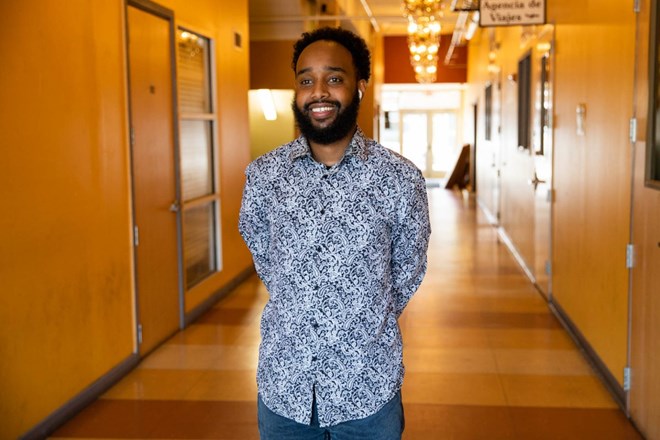
Credit: Jaida Grey Eagle | Sahan Journal
In his recent Minnesota campaign stop, President Donald J. Trump invited some immigrant business owners to appear with him on the tarmac at the airport. Their assignment: talk about the damages that followed the killing of George Floyd and how the city of Minneapolis failed them. In that spirit, a Liberian-born firefighter, KB Balla, bantered with the president about his work to rebuild a new sports bar destroyed during the unrest in May.
Trump campaign staffers had donated to Balla’s GoFundMe, contributions first reported by Fox news. At the podium, Trump said, “Maybe we can help you out a bit”—although to date the administration has rejected Governor Tim Walz’s applications for federal disaster and small business aid.
Since its beginnings, Lake Street has attracted immigrant businesspeople. In the late 19th century, the immigrants were Norwegian, Swedish, Danish, Greek, and they hung out their shingles for shoe stores, insurance agencies, floral shops and more.
More than 100 years later, Lake Street remains a vital artery for immigrant entrepreneurs. Many of the proprietors these days are East African, Latino, and Asian. Many of their storefronts, however, suffered massive damage from fires, looting and destruction during the civil unrest that followed the George Floyd killing. The neighborhood has pointed to an underwhelming response from police to preserve the neighborhood during the worst of that week in May. And Walz’s calls for federal help seem to be going nowhere.
The resilience along Lake Street, instead, seems to be coming from the community itself. A flow of volunteers showed up after the destruction to help clean and board up business fronts. And almost immediately, those barriers blossomed into a canvas for political art and memorials.
Sahan Journal recently caught up with a few immigrant business owners to see where they are, a few months after the protests. We could see examples of how the neighborhood is holding together: During our visit with Mireya Camila and Camilo Ramos, of Sol Travel, one of their fellow business owners from next door dropped by to check in on them. How were they doing? Did they need anything?
Camila and Ramos talked about how hard it’s been but they were moving forward. When asked about the plywood art, they said “We think we will probably keep them up for a long time. We don’t know when we want them taken down. Maybe we will have them up forever?”
Here’s what Camila and Ramos, and other immigrant business owners, have to say about what drew them to Lake Street, what happened there after the killing of George Floyd and where they go next—in their own words.
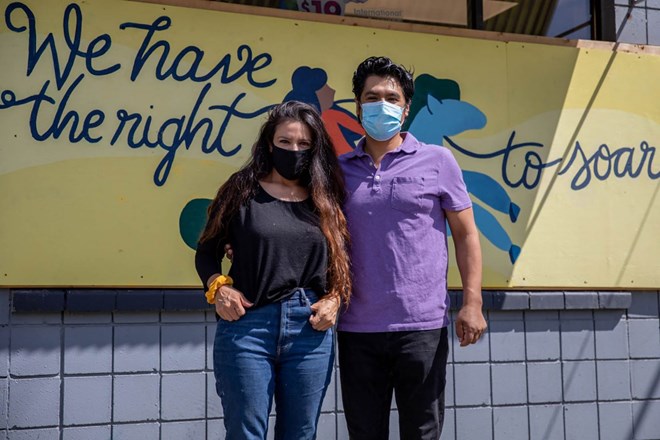
Credit: Jaida Grey Eagle | Sahan Journal
‘Nobody is helping’
Mireya Camila and Camilo Ramos, Sol Travel
We have been here in Minnesota, from Ecuador, since 2003. We like it because it’s a nice place, good people. We work with our community, especially Latino and immigrant people. We help them and they help us.
What makes Lake Street different is there are a lot of immigrant people. So we want to help the community by opening this kind of business: money transfer, cashing checks, money repayments. That’s what I think is helpful for this area.
In the beginning of the pandemic, since March, we closed. We went down in the business like 95 percent. We used to have an employee but she was not working. We stayed home. In May, we tried to open, but people didn’t come because they weren’t working.
Then the civil unrest came and it was the worst. The little bit we had here in this store, it was destroyed and stolen. We went to zero and they stole everything that we had saved for many years.
I thought maybe the City of Minneapolis or the state or someone would try to contact us to see if we need something. But nobody has, nobody is helping. We lost a lot here, everything that we have. My daughter’s school, their parents have been helping with food. They went with GoFundMe, and that money we’ve been using to pay for the rest of this.
The Lake Street Council: We applied with them but I haven’t heard anything. We did get the Du Nord grant for $15,000 last week and that was the first grant we received.
We tried to open again. We are planning to make this barrier and more security and everything. And then business has come back. I know it’s not on a normal basis. But I think it’ll just be little by little.
We want to help the community because they have been looking to us for a lot. You know, this area is good for the people. We want to come back again.
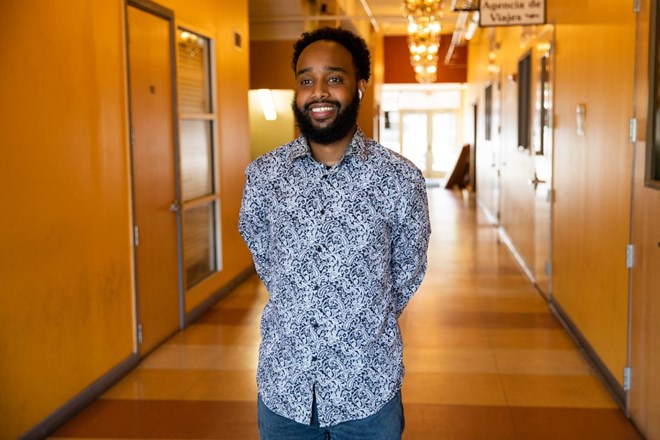
Credit: Jaida Grey Eagle | Sahan Journal
‘We’ve always had some type of businesses, wherever we lived, no matter what country we lived in’
Mowlid Jigre, Building manager/Insurance agent, Jigjiga Business Center
Originally we are from Ethiopia, a city called Jigjiga, which is the name of the building.
I came here when I was three years old in the late ’90s.
When we first moved to America, we lived in California, in the Bay Area, for about eight to nine years. Then we moved to Seattle, Washington, for about 10 years. Then, the last almost 4, we’ve been living in Minnesota, to get a better opportunity for our family. Opportunity that wasn’t present in other places we lived.
You know there’s a big Somali community out here. My dad actually bought this commercial building in 2016. I manage the building and manage the daycare that we’re in right now. And I actually run an insurance business with one of my associates. I’m just, you know, trying to help wherever I’m needed.
I feel like business is in my blood. My grandma was a businesswoman, my dad, my uncles are. It just runs in the family. We have a pharmacy back home in Africa. And then my dad built a hotel in Africa. Our grandma had a store in Africa. I feel like we’ve always had some type of businesses, wherever we lived, no matter what country we lived in. I feel like businesses are just really deeply rooted in us. I feel like I am meant to do that.
Certain days it was good, some days it wasn’t. You know the community here—it’s not bad. But on Lake Street you see people that are unfortunately hooked on drugs. Summertime, especially, we’d have to kick people out that were hiding in our downstairs basement, trying to shoot up.
Almost 90 percent of businesses got impacted by the George Floyd riots. We were ransacked, almost 15 to 20 windows got shattered. Over probably $50,000 worth of merchandise got stolen. Somebody chainsawed our ATM and stole a couple of thousand dollars.
I see why the civil unrest was there. But it was Black-owned businesses getting affected, you know, by an African American man being killed.
It was kind of disheartening at first. But that next day, we had people coming in with brooms, mops, rags to clean it up. So it showed that the community can come together, especially when something tragic happens.
My friend gave me the idea to make a GoFundMe page. And I kind of ran with the idea. Instead of just focusing on our building, I put down Somali-owned businesses affected by rioters. You can see that the goal was $50K; it actually doubled that. So I increased it to $100K, and that’s how much we did. It was overwhelming to see so many people show support from all over the world.
We made an application process. I designed the applications. We actually put them in English and Somali for people that might not speak English.
It was actually businesses that we distributed the money to, give or take. Some of them were in this building, some of them were just in the area. We didn’t just help Somali businesses. We helped a few Hispanic-owned businesses in the area that were affected by the riots, too. Somalis and Hispanics on Lake Street? We have a lot of business out here together, you know?
It took us two months to get the windows fixed. We’re still cleaning up. The ATM’s are still broke as you can see. We are still dealing with the aftermath of the riots.
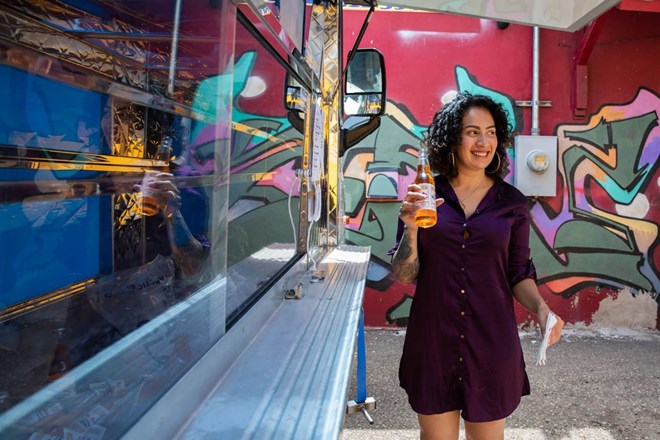
Credit: Jaida Grey Eagle | Sahan Journal
‘Everyone is telling me I can’t do it? Somehow I’m gonna make it.Cesia Abigail Bairas, Owner, Abi’s Cafe
My family is from El Salvador, I came here when I was really young, and then I moved to Washington D.C., I came here for high school—I went to Edison High School here. I left again back to the East Coast. Then five years ago, I came here to open the restaurant.
I saw a lot of potential here. There’s only a few El Salvadoran restaurants around here. When I first opened Abi’s Cafe, no one was too happy about it because of the area. It’s just really bad there’s drugs, prostitutes, a bunch of stuff. Who wants to go to Lake Street? Everyone knows that all the Latinos or all the bad people are on Lake Street.
I took it like a challenge. Everyone is telling me I can’t do it? Somehow I’m gonna make it.
Here I am five years later, not once has anyone broke into my business.
My cousin, he’s a cop. And you know, we always believed that if you want to see change, you have to get in the system to where that problem is. What can I do as a business owner, in a community like Lake Street, that could be positive all around my business. One of the things that I’ve done is putting more lights outside—just making obvious changes that maybe the city hasn’t even done.
I’ve been focusing on doing a lot of community work, like maybe bringing my grill somewhere and feeding people. I use Abi’s Cafe as a storage place for a donation drop-off area: The restaurant was full. Literally, just full front and back.
Social media was one of the big things.
When those six buildings were burning over there on Chicago and Lake, it got to a point where I think I was the only one going live on Facebook: Hey guys, this is what’s really happening over here and we don’t have any help.
That’s what I did throughout that whole time, literally going live every day, so people can see how many volunteers were here helping, picking up the trash from the damages the night before. And that was three days in a row. It was a crazy time.
If you asked me, What’s your vision right now?, I don’t have one here. I don’t see myself here anymore. I want better. Like, I know I can do more.
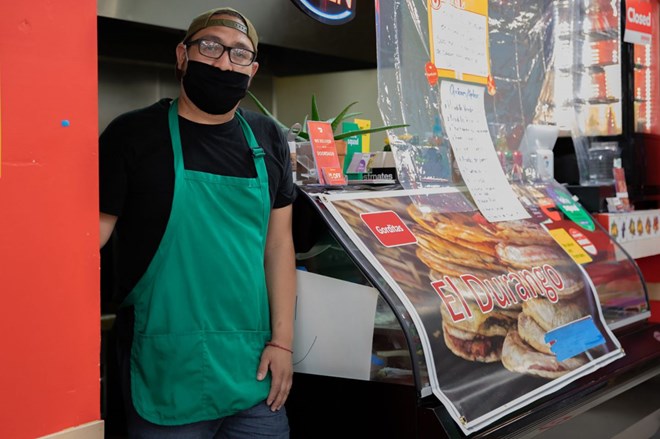
Credit: Jaida Grey Eagle | Sahan Journal
‘We always had it in mind to open a business’Manuel Rutiaga, owner, El Durango Gorditas
I’m from Mexico, northern Mexico. My city is called Durango, That’s why we call the business El Durango Gorditas. I was here visiting my brothers and I decided to stay.
When I was back in Mexico, my mom and I have a really small business selling gorditas and hamburgers. Not just me, my family, my sisters, we always had it in mind to open a business. We’d say things like, “Oh, when we open a restaurant we are going to do this and we are going to do that.” I love to cook, I love the flavor of my mom’s and sister’s food. I realized, maybe I can open my own restaurant. To me, it’s good, and I think people really like my food.
My business is not too old. I started the last day in December. And then COVID-19 hit right away. At first it was kind of busy, it was really busy for me. Then, later, we only sold food to- go and pick-up. I had to take all my chairs and tables inside: The sales really went down. Later, the city let us put out two or three tables, and when we did, sales went back up a little bit, but it’s still down
The protests? They got in, they broke the door in the back, they came into my business and they destroyed things inside. They broke a lot of things. Things got destroyed.
It’s fine. We are doing OK. Everything went back to normal.
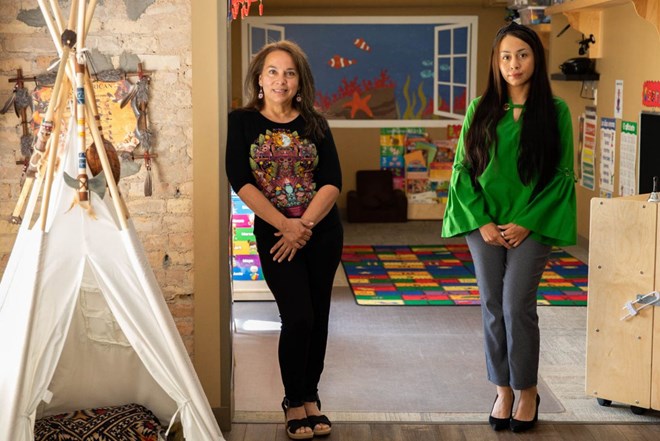
Credit: Jaida Grey Eagle | Sahan Journal
‘We wanted to have a bigger school. And now, we don’t know.’
Tania Riviera Perez and Maria Gali, Owner and teacher, Circulos Childcare Center
We were in Tamaulipas, Mexico, trying to find changes in life. I heard that Minnesota is a wonderful state to move to. And it was.
I am a teacher; my daughter is a teacher as well. I was working with a program, ECFE [Early Childhood Family Education], in St. Paul, with public schools. I started learning more about early childhood. I was very motivated: Oh, I can do this on my own, and better. And I can be my own boss.
We believe that our best way to teach is not to be indoors. I can adapt what I learned in Mexico, when I was a child. Give the opportunity to kids to learn in the way that I was learning—being outdoors and doing many things for myself, on my own.
All the classrooms were full: We had a max capacity of 79 students. Kids were playing freely. Teachers were rarely sick. You know, just everyone was healthy and unworried.
And that’s kind of what we’re doing now, but at a lower capacity.
We were closed, almost for two weeks. And not only were we closed, but there is still a lot of stress here because the area has been so violent. A lot of crimes.
I was impacted by when we were closed and many parents were, too. They were worried to bring their kids here when we were only one block from Lake Street. You know, many things happen in this area. It has been a little tough.
For me, I try to go out. I love to be by the rivers, the lakes. Just to leave all my worries. I go for a walk.
Depending on the circumstances, we were planning to buy the next building, to expand. We were talking with the owners. We wanted to have a bigger school, because we have all these people looking to be here. And now, we don’t know. Is this the new normal, where we don’t know what will happen the next day.
We are living every day, day by day, and we are not making plans. We have our dreams, of course. But we are waiting. Holding.